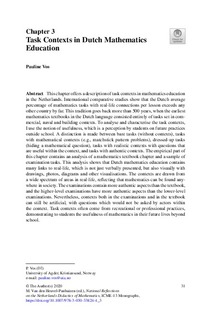Task Contexts in Dutch Mathematics Education
Chapter, Peer reviewed
Published version

Åpne
Permanent lenke
http://hdl.handle.net/11250/2635659Utgivelsesdato
2020Metadata
Vis full innførselSamlinger
Originalversjon
Vos, P. (2019). Task Contexts in Dutch Mathematics Education. In M. van den Heuvel-Panhuizen (Ed.), National Reflections on the Netherlands Didactics of Mathematics. Teaching and Learning in the Context of Realistic Mathematics Education (p. 31-53). Cham: Springer. doi: 10.1007/978-3-030-33824-4_3Sammendrag
This chapter offers a description of task contexts in mathematics education in the Netherlands. International comparative studies show that the Dutch average percentage of mathematics tasks with real-life connections per lesson exceeds any other country by far. This tradition goes back more than 500 years, when the earliest mathematics textbooks in the Dutch language consisted entirely of tasks, in which mathematics was put to use in commercial contexts. In this chapter characteristics of contexts in mathematics tasks in the Netherlands are studied. Underlying frame is the notion of usefulness, which is a perception by students on future practices outside school. A distinction is made between bare tasks (without contexts), tasks with mathematical contexts (e.g. matchstick pattern problems), dressed-up tasks (hiding a mathematical question), tasks with realistic contexts and questions that are useful within the context, and tasks with authentic contexts. The empirical part of this chapter is an analysis of a mathematics textbook chapter and a sample of examination papers. The analysis shows that Dutch mathematics education contains many links to real-life, which is not just verbally presented, but also visually with drawings, photos, diagrams and other visualisations. The contexts are drawn from a wide spectrum of areas in real-life, reflecting that mathematics can be found anywhere in society. The examinations contain more authentic aspects than the textbook, and the higher level examinations have more authentic aspects than the lower level examinations. Nevertheless contexts can be artificial and the posed questions would not be asked by actors within the context. Task contexts often come from recreational or professional practices, demonstrating to students the usefulness of mathematics in their future lives beyond school.
